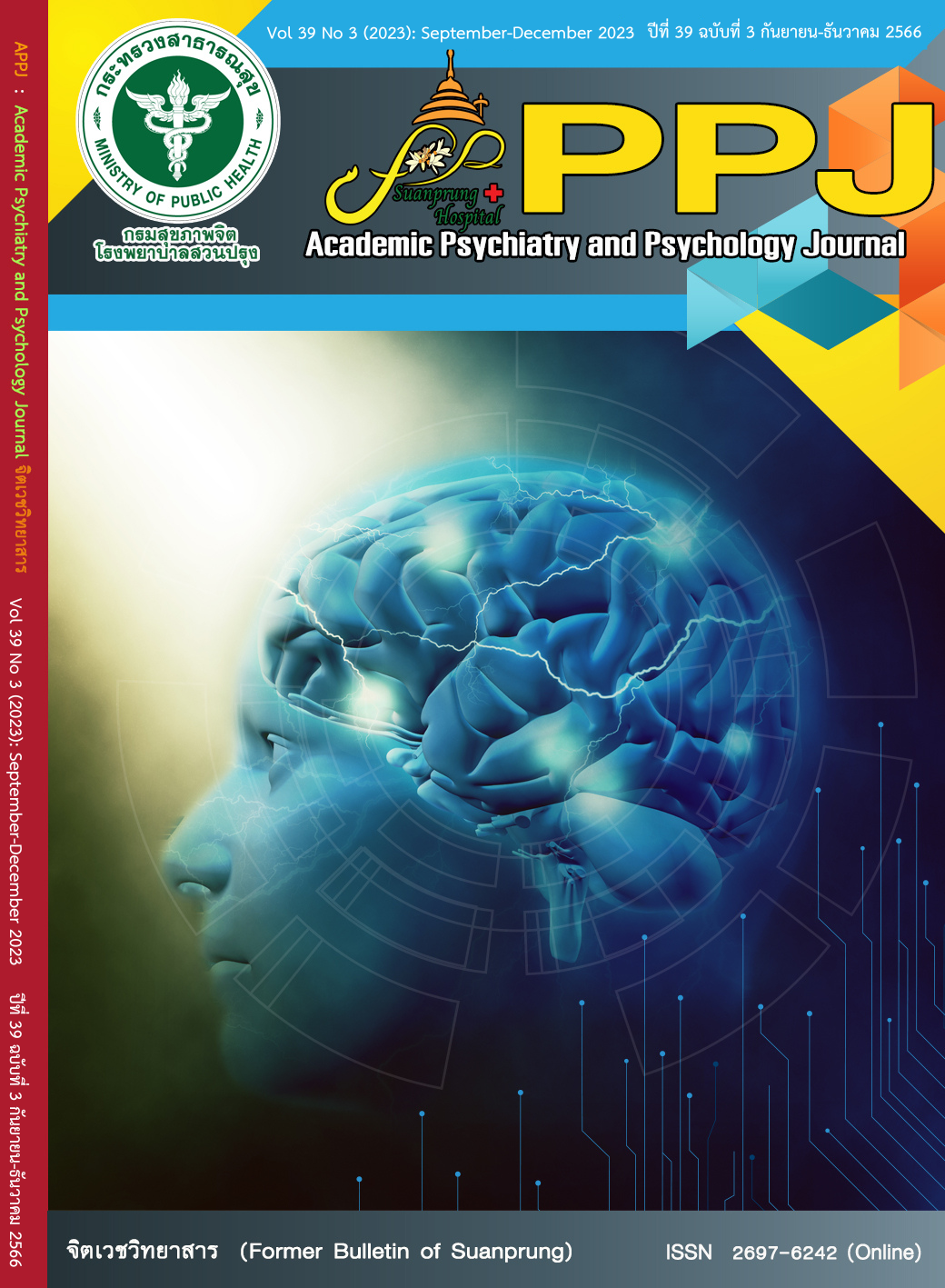The Correlation Between a High-risk Score of Prediction of Alcohol Withdrawal Severity Scale (PAWSS) and Complicated Alcohol Withdrawal Syndrome (AWS) at Thanyarak Khonkaen Hospital: Pilot Study
Main Article Content
Abstract
Objectives: This study aimed to investigate the correlation between a high-risk score of PAWSS (greater-than or equal to 4) and complicated AWS at Thanyarak Khonkaen Hospital.
Methods: A pilot, retrospective study was conducted. The data was collected from all hospitalized patients in the alcohol detoxification ward between April 1st and 30th, 2023. Patients diagnosed with alcohol dependence based on DSM-4 criteria were included. Clinical data were reviewed, and the primary outcome was the correlation between a high-risk score of PAWSS and complicated AWS, measured using odds ratio (OR) and a 95% confidence interval (95%CI). Statistical significance was determined by a p-value < 0.05.
Results: Among the 30 patients included, 12 (40%) were in the complicated AWS group. Baseline characteristics were similar between the two groups. In the complicated AWS group, 75% had a greater-than or equal to 4, compared to 78% in the uncomplicated AWS group. However, there was no significant correlation between a high-risk score of PAWSS and complicated AWS (OR, 1.17; 95%CI, 0.21-6.48). Nonetheless, the complicated AWS group had a significantly higher maximum CIWA-Ar score, higher benzodiazepine dose administered in 7 days, and a longer time to improve AWS.
Conclusion: There was no correlation between a high-risk score of PAWSS and complicated AWS among hospitalized patients undergoing alcohol detoxification. Further studies should explore additional factors to develop appropriate preventative strategies.
Article Details

This work is licensed under a Creative Commons Attribution-NonCommercial-NoDerivatives 4.0 International License.
บทความหลังผ่านการปรับแก้จากกองบรรณาธิการแล้ว เป็นลิขสิทธ์ของวารสารจิตเวชวิทยาสาร โรงพยาบาลสวนปรุง กรมสุขภาพจิต กระทรวงสาธารณสุข ห้ามเผยแพร่เพื่อประโยชน์ทางการค้าโดยไม่ได้รับอนุญาต แต่อนุญาตให้เผยแพร่บทความดังกล่าวเพื่อประโยชน์ทางการศึกษาแก่ประชาชนทั่วไป ทั้งนี้กองบรรณาธิการไม่จำเป็นต้องเห็นด้วยกับบทความหรือข้อคิดเห็นใดๆ ที่ปรากฏในวารสารสวนปรุง
References
World Health Organization. Global status report on alcohol and health 2018 [Internet]. Geneva: World Health Organization; 2018 [cited 2023 Mar 27]. 450 p. Available from: https://apps.who.int/iris/handle/10665/274603
The National Statistical Office. National annual survey report 2017 (in Thai) [Internet]. [cited 2023 Mar 27]. Available from: http://www.nso.go.th/sites/2014/Pages/News/2561/N30-08-61-2.aspx
Kattimani S, Bharadwaj B. Clinical management of alcohol withdrawal: A systematic review. Ind Psychiatry J. 2013;22(2):100–8.
Etherington JM. Emergency management of acute alcohol problems. Part 1: Uncomplicated withdrawal. Can Fam Physician. 1996 Nov;42:2186–90.
Victor M, Adams RD. The effect of alcohol on the nervous system. Res Publ - Assoc Res Nerv Ment Dis. 1953;32:526–73.
Victor M, Brausch C. The role of abstinence in the genesis of alcoholic epilepsy. Epilepsia. 1967 Mar;8(1):1–20.
Schuckit MA. Recognition and management of withdrawal delirium (delirium tremens). N Engl J Med. 2014 Nov 27;371(22):2109–13.
Schmidt KJ, Doshi MR, Holzhausen JM, Natavio A, Cadiz M, Winegardner JE. Treatment of Severe Alcohol Withdrawal. Ann Pharmacother. 2016 May;50(5):389–401.
Goodson CM, Clark BJ, Douglas IS. Predictors of severe alcohol withdrawal syndrome: a systematic review and meta-analysis. Alcohol Clin Exp Res. 2014 Oct;38(10):2664–77.
Schuckit MA. Alcohol-use disorders. Lancet Lond Engl. 2009 Feb 7;373(9662):492–501.
Tsuang JW, Irwin MR, Smith TL, Schuckit MA. Characteristics of men with alcoholic hallucinosis. Addict Abingdon Engl. 1994 Jan;89(1):73–8.
Stephane M, Arnaout B, Yoon G. Alcohol withdrawal hallucinations in the general population, an epidemiological study. Psychiatry Res. 2018 Apr;262:129–34.
Hillbom M, Pieninkeroinen I, Leone M. Seizures in alcohol-dependent patients: epidemiology, pathophysiology and management. CNS Drugs. 2003;17(14):1013–30.
Eyer F, Schuster T, Felgenhauer N, Pfab R, Strubel T, Saugel B, et al. Risk assessment of moderate to severe alcohol withdrawal--predictors for seizures and delirium tremens in the course of withdrawal. Alcohol Alcohol Oxf Oxfs. 2011;46(4):427–33.
Wood E, Albarqouni L, Tkachuk S, Green CJ, Ahamad K, Nolan S, et al. Will This Hospitalized Patient Develop Severe Alcohol Withdrawal Syndrome?: The Rational Clinical Examination Systematic Review. JAMA. 2018 Aug 28;320(8):825–33.
Livne O, Feinn R, Knox J, Hartwell EE, Gelernter J, Hasin DS, et al. Alcohol withdrawal in past-year drinkers with unhealthy alcohol use: Prevalence, characteristics, and correlates in a national epidemiologic survey. Alcohol Clin Exp Res. 2022 Mar;46(3):422–33.
Dixit D, Endicott J, Burry L, Ramos L, Yeung SYA, Devabhakthuni S, et al. Management of Acute Alcohol Withdrawal Syndrome in Critically Ill Patients. Pharmacotherapy. 2016 Jul;36(7):797–822.
Maldonado JR, Sher Y, Ashouri JF, Hills-Evans K, Swendsen H, Lolak S, et al. The “Prediction of Alcohol Withdrawal Severity Scale” (PAWSS): systematic literature review and pilot study of a new scale for the prediction of complicated alcohol withdrawal syndrome. Alcohol Fayettev N. 2014 Jun;48(4):375–90.
Maldonado JR, Sher Y, Das S, Hills-Evans K, Frenklach A, Lolak S, et al. Prospective Validation Study of the Prediction of Alcohol Withdrawal Severity Scale (PAWSS) in Medically Ill Inpatients: A New Scale for the Prediction of Complicated Alcohol Withdrawal Syndrome. Alcohol Alcohol. 2015 Sep 1;50(5):509–18.
Bedienungsanleitung ACE DA7100_D_E_F_NL_I_ES.pdf [Internet]. [cited 2023 Oct 13]. Available from: https://www.ace-technik.com/documents/products/Media/Bedienungsanleitung%20ACE%20DA7100_D_E_F_NL_I_ES.pdf?ver=1662972992

